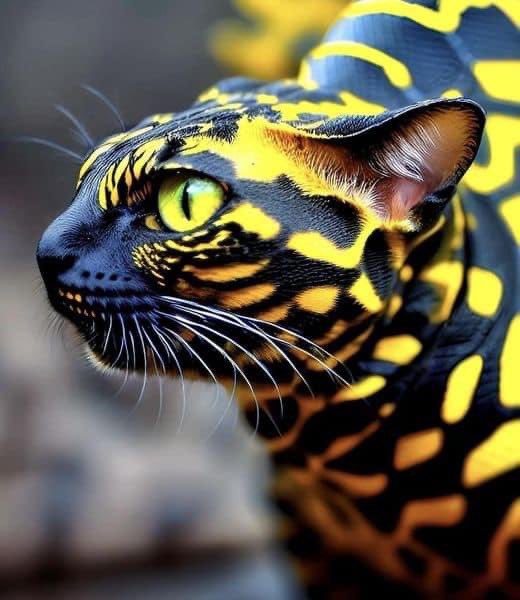
Once in a while, there comes along a stunning animal photograph that takes the internet by storm. People share it with their friends while talking at length about the many surprises of nature.
Many photos and videos of strange-looking creatures, in internet's fast-changing digital environment, go on to become huge hits. However, some get flagged and reported for being fake. Nevertheless, they still manage to capture our imaginations for a short period.
That’s exactly what a viral photo of cat, which is apparently called Serpens Catus or the 'Amazon Snake Cat', has done recently on TikTok, Twitter, and a few other platforms.
The image in question shows a cat with neon-yellow and black stripes on its fur, which we usually associate with a snake native to southeast Asia. The image has led many to question whether the creature is real or not.
Sharing the image on Twitter, a user claimed: "Serpens catus is the rarest species of feline on Earth. These Animals live in hard-to-reach regions of the Amazon rainforest, and therefore they are relatively poorly studied."
Serpens catus is the rarest species of feline on Earth .These Animals live in hard to reach regions of the Amazon rainforest , and therefore they are relatively poorly studied .The first images capturing the snake cat appeared only in the 2020.Weighs up the 4 stone pic.twitter.com/rpeMQKCF4I
— Jeff_kamara2 (@Kamara2R) March 14, 2023
The tweet went on to add that the cat weights up to 4 stones and first appeared in 2020.
The image caught the eye of several users, who flagged the feline as not being real.
A user wrote, “Obvious fake. No known gene can produce natural hair or fur of those (navy and bright yellow) colours.”
It didn't take time for the photo to reach zoology experts as the color and patterns in the photo had a strong resemblance to the eptilian boiga dendrophila. However, it was eventually concluded that Serpens catus are not real as there is no evidence to support the cat has ever existed.
Cats native to South America are found in the Amazon rainforest. However, there has never been a reported sighting of one with neon-yellow stripes.
Boiga dendrophila, the only creature with a similar pattern on its body, is a species of rear-fanged venomous snake in the family Colubridae. They are endemic to southeast Asia.

0 Comments